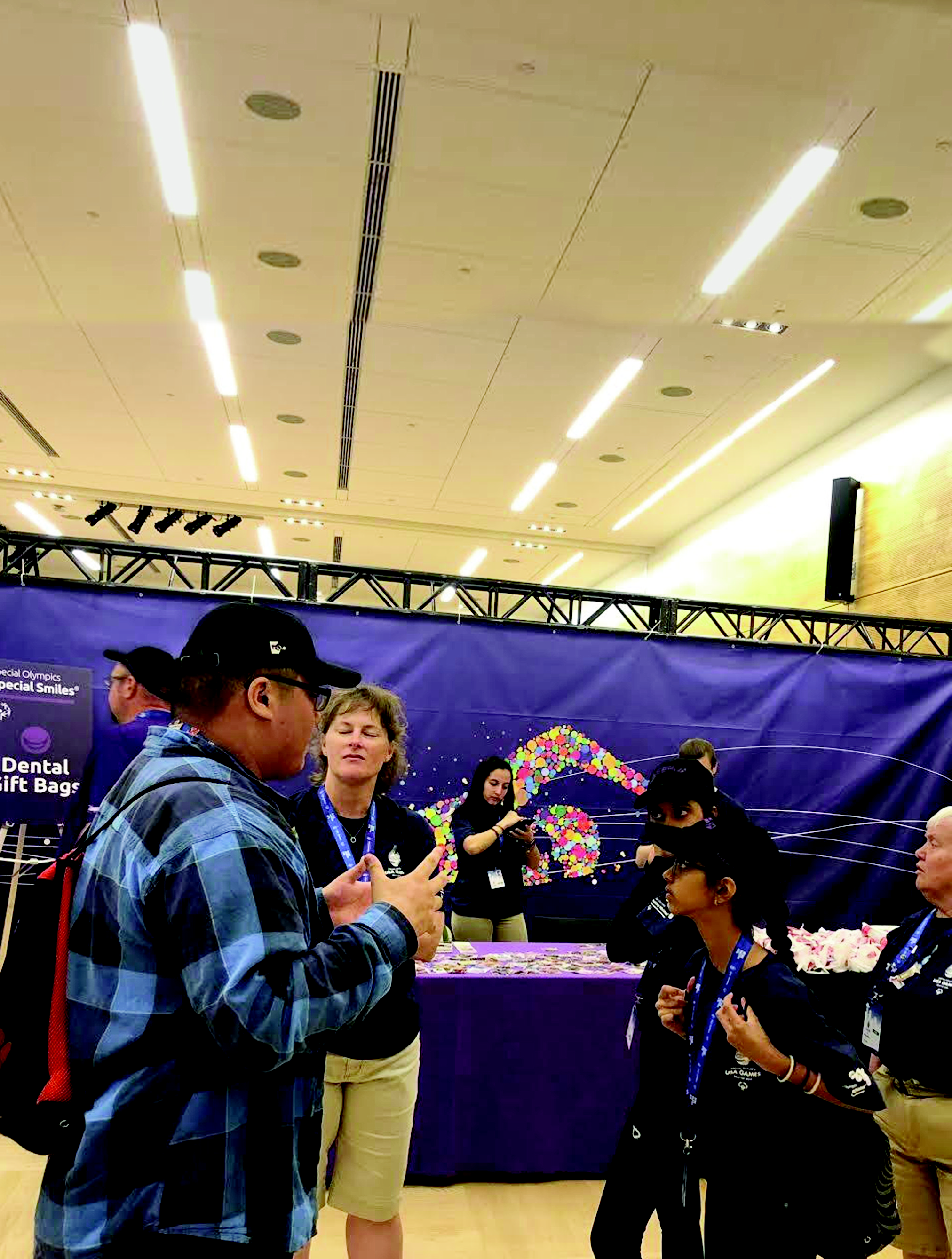THOUGHTS ON VOLUNTEERING AT THE HEALTHY ATHLETES VILLAGE
BY JONATHAN WONG
Growing up, my parents made certain that my brother and I were raised with many opportunities to volunteer and serve others. My father has been involved for several years with the American Academy of Developmental Medicine and Dentistry (AADMD), an organization dedicated to represent healthcare professionals who provide care to individuals with intellectual disabilities and/or neurodevelopmental disorders. He currently is one of two Global Clinical Advisors for the Special Smiles discipline of the Healthy Athletes program. Special Smiles is one of the Special Olympics' eight disciplines to ensure that the athletes have been provided with free screenings pertaining multiple disciplines of healthcare. The eight disciplines are Special Smiles (dentistry), Fit Feet (podiatry), Fun Fitness (physical therapy), Health Promotion (healthy lifestyle), Healthy Hearing (audiology), MedFest (sports physicals), Opening Eyes (optometry and vision), and Strong Minds (emotional and mental well-being). These disciplines provide screenings to the athletes and provide certain basic services, like corrective/protective eyewear from the optometry discipline (Opening Eyes) and/or mouthguards from the dentistry discipline (Special Smiles) but, most important, education to athletes on proper health.
Having seen the several facets of Special Olympics, I wanted to be more involved with the organization. Because I am interested in a career in the healthcare industry, I focused my volunteering attention towards the Fun Fitness division of the Special Olympics.
I volunteered a few weeks earlier at the Northern California games of the Special Olympics, mainly doing photography. I was able to see many of the disciplines in action through the lens, an experience motivated me to volunteer on a national level.
My role at the Healthy Athletes village on the campus of the University of Washington mainly consisted of directing volunteer escorts to assist athlete groups with checking in to the different disciplines. Another component of my role was to ensure that none of the disciplines were too crowded or too empty. I was given a walkie-talkie to communicate with a volunteer downstairs in the lobby; his role was to escort athlete groups up from the waiting area to check in to the main registration table. Helping coordinate many teams to the various disciplines was like orchestrating music. The experience was humbling. I probably met an athlete or coach from every state, including athletes from the District of Columbia.
As a volunteer, I find the gratitude of those I help to be more than rewarding. Waiting for their escorts, I would ask the athletes and coaches how their days were, how their events went, and what their stories were. From their responses I learned about many challenging conditions that these athletes have faced. I was inspired by their stories of perseverance, bravery, and determination to keep their dreams alive. For example, one of the coaches told me that in his 20-plus years of coaching, he enjoyed his 10 or so years coaching Special Olympics the most. He believed that the athletes were more honest and placed more effort into all of their practices and events.
From volunteering at the US Games for the Special Olympics Healthy Athletes, I observed how only a few medical professionals are willing to treat patients with intellectual or developmental disabilities. Finding competent health providers seems to be a universal challenge. The Healthy Athletes program introduces volunteers to underserved athletes who are overlooked because they require a different type of attention and care. Athletes should be seen by their local doctors and clinicians before coming to the national games. At times, their evaluations are inaccurate, at times due to lack of attention. For example, one athlete had his wisdom teeth extracted in the mobile Special Smiles van from being in pain and not being able to find a dentist. Another athlete, whose local doctor diagnosed his/her hearing as "in good condition." However, when the Healthy Hearing volunteers tested the athlete, it was so poor, he/she was fitted for a hearing aid.
I am currently studying Health/Exercise Sciences at the University of the Pacific in the hopes of becoming a physical therapist. The reason I chose this path was to have a future where I can treat people on a more personal level, and seeing the Healthy Athletes' level of attention and care inspired me more to pursue the field. I am deciding between clinical physical therapy and sports medicine. Regardless where I end up, this experience volunteering for the Special Olympics has given me a better understanding of how patients with special needs should be treated. I want people to know that people with special needs or intellectual disabilities are still people. They have thoughts and emotions as valid as yours and mine. In everyday life, people tend to avoid those of intellectual disabilities, either due to inconvenience or complications, but it requires a certain level of care that is not exclusive to professionals in the medical business. •

Jonathan (JP) Wong is a Third-Year undergraduate at the University of the Pacific, College of the Pacific. He is a Health/Exercise, Sports Science Major.